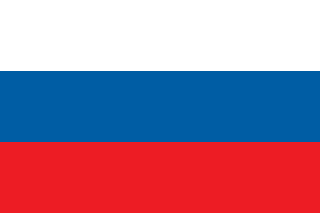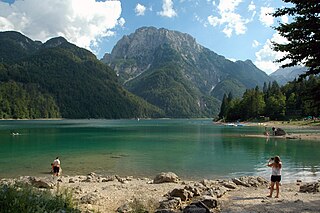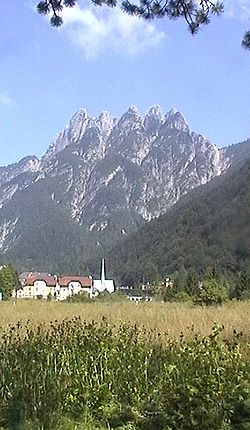
Kobarid is a settlement in Slovenia, the administrative centre of the Municipality of Kobarid.

Friuli-Venezia Giulia is one of the 20 regions of Italy and one of five autonomous regions with special statute. The regional capital is Trieste on the Gulf of Trieste, a bay of the Adriatic Sea.

Tarvisio is a comune (municipality) in the Regional Decentralization Entity of Udine, in the autonomous Friuli-Venezia Giulia region of Italy.

The Duchy of Carniola was an imperial estate of the Holy Roman Empire, established under Habsburg rule on the territory of the former East Frankish March of Carniola in 1364. A hereditary land of the Habsburg monarchy, it became a constituent land of the Austrian Empire in 1804 and part of the Kingdom of Illyria until 1849. A separate crown land from 1849, it was incorporated into the Cisleithanian territories of Austria-Hungary from 1867 until the state's dissolution in 1918. Its capital was German: Laibach, today Ljubljana.

Bovec is a town in the Littoral region in northwestern Slovenia, close to the border with Italy. It is the central settlement of the Municipality of Bovec.

The Loibl Pass or Ljubelj Pass is a high mountain pass in the Karawanks chain of the Southern Limestone Alps, linking Austria with Slovenia. The Loibl Pass road is the shortest connection between the Carinthian town of Ferlach and Tržič in Upper Carniola and part of the European route E652 from Klagenfurt to Naklo.

Sella Nevea, at an altitude of 1,195 m (3,921 ft), is a high mountain pass in the Julian Alps, in the Friuli-Venezia Giulia region of northeast Italy. Sella Nevea also lends its name to a frazione of the Chiusaforte municipality and the nearby Kanin-Sella Nevea Ski Resort.

Malborghetto Valbruna is a comune (municipality) in the Regional decentralization entity of Udine in Friuli-Venezia Giulia, north-east Italy.

Pontebba is a comune (municipality) in the Regional decentralization entity of Udine in the Italian region of Friuli-Venezia Giulia.

The Predil Pass or Predel Pass is a high mountain pass on the border between Italy and Slovenia.

Arnoldstein is a market town in the district of Villach-Land in the Austrian state of Carinthia.

Bad Bleiberg is a market town in the district of Villach-Land, in Carinthia, Austria. Originally a mining area, especially for lead, Bad Bleiberg today due to its hot springs is a spa town.

The Burg Griffen is a castle on a 130m/427 ft-high limestone mountain above the town of Griffen in the Austrian state of Carinthia.

Lake Predil is a lake near Cave del Predil, part of the Tarvisio municipality in the Province of Udine, in the Italian region of Friuli-Venezia Giulia.

The Slizza (Italian) or Gailitz is an Alpine torrent in Italy and Austria, a right tributary of the river Gail. Its drainage basin is 212.5 km2 (82.0 sq mi).

The Kluže Fortress is a fort near the town of Bovec in northwestern Slovenia.

The Patria del Friuli was the territory under the temporal rule of the Patriarch of Aquileia and one of the ecclesiastical states of the Holy Roman Empire. In 1420, the Republic of Venice acquired it, but it continued to be ruled for some time under its own laws and customs.

The Italian Julian Alps are a mountain range that is part of the Italian Alps that extends from Italy to Slovenia.

Fusine in Valromana is a frazione of the comune of Tarvisio in the Province of Udine, in the autonomous Friuli-Venezia Giulia region of northeastern Italy.

The Austro-Hungarian fortifications on the Italian border were constructed in the 19th and early 20th centuries to protect against invasion from Italy. Most were built in what is today the Trentino-Alto Adige region; some built outside this territory were ceded to Italy after 1866. By the First World War many of them were obsolete, but nevertheless played a role in deterring and containing Italian assaults.























